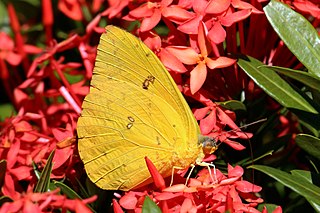
Phoebis sennae, the cloudless sulphur, is a mid-sized butterfly in the family Pieridae found in the Americas. There are several similar species such as the yellow angled-sulphur, which has angled wings, statira sulphur, and other sulphurs, which are much smaller. The species name comes from the genus Senna to which many of the larval host plants belong.

Arawacus is a genus of butterflies in the family Lycaenidae. They are commonly called stripestreaks. The species of this genus are found in the Neotropical realm.

Phoebis, or sulphurs, is a genus of butterflies, belonging to the subfamily Coliadinae of the "whites" or family Pieridae. They are native to the Americas.

Kricogonia lyside, the lyside sulphur or guayacan sulphur, is a North American, Caribbean, and South American butterfly in the family Pieridae.
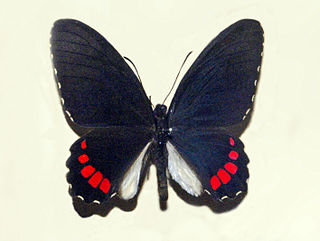
Parides erithalion, the variable cattleheart, is a North and South American butterfly in the family Papilionidae. The species was first described by Jean Baptiste Boisduval in 1836.
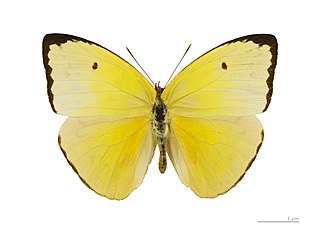
Aphrissa statira, the statira sulphur, is a species of Lepidoptera in the family Pieridae. The species is a medium-sized yellow butterfly, with females more pale than males. They are found from southern regions of Florida and Texas through southern Brazil and northern Argentina. The caterpillars feed on the leaves of several local host plants, while adults prefer to feed on the nectar of red or orange colored flowers. The species is most noted for their dramatic migrations in the tropical areas of the Americas. They have been the subject of many studies about how butterflies navigate and orient during migration.
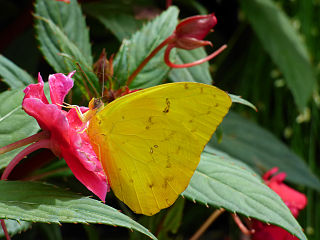
Phoebis philea, the orange-barred sulphur, is a species of butterfly found in the Americas including the Caribbean.
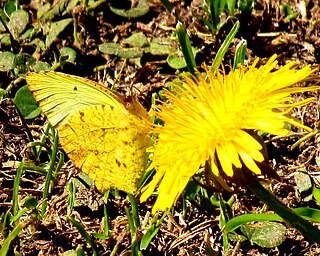
Phoebis neocypris, the tailed sulphur, is a butterfly in the family Pieridae. It is native to Mexico, Central America, and South America. There is a record for one stray in southern Texas.

Pieriballia is a genus of butterflies in the family Pieridae erected by Alexander Barrett Klots in 1933. Its only species, Pieriballia viardi, the painted white or viardi white, was first described by Jean Baptiste Boisduval in 1836. It is found from Mexico to Bolivia and Paraguay. Strays can be found in southern Texas in the United States. The habitat consists of rainforests and transitional cloud forests.
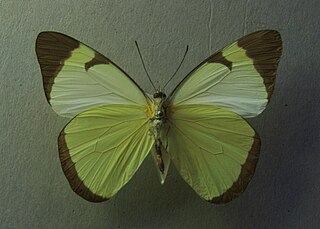
Melete lycimnia, the common melwhite, primrose flag or lycimnia white flag, is a butterfly in the family Pieridae. It is found from Texas in the United States to Bolivia. The habitat consists of lowland rainforests.

Aphrissa fluminensis, the Rio de Janeiro sulphur, is a butterfly in the family Pieridae. It is found in Costa Rica, Brazil, and Peru.
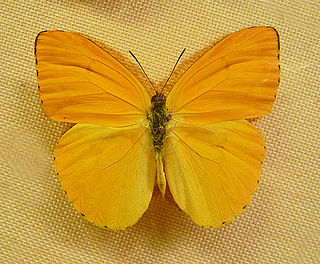
Phoebis argante, the apricot sulphur or Argante giant sulphur, is a butterfly in the family Pieridae.

Melanis is a genus in the butterfly family Riodinidae present in the Neotropical realm.
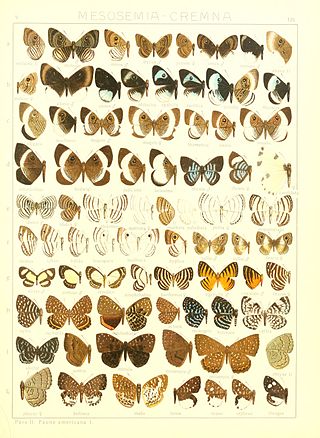
Napaea is a genus in the butterfly family Riodinidae present only in the Neotropical realm.

Baeotis is a butterfly genus in the family Riodinidae. They are resident in the Americas.
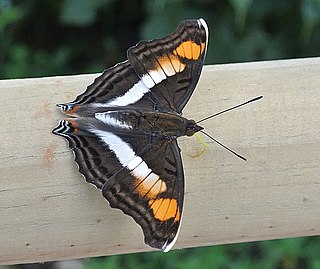
Doxocopa linda, or Linda's emperor, is a species of Neotropical butterfly in the family Nymphalidae and subfamily Apaturinae. It was described by Cajetan Felder and Rudolf Felder in 1862. It is found in Peru, Ecuador and the Brazilian state of Amazonas.
















